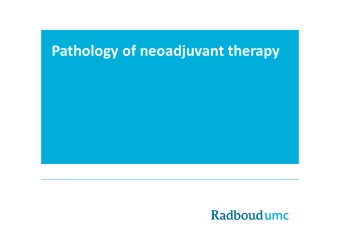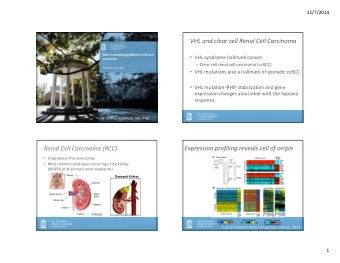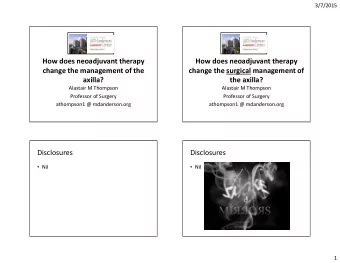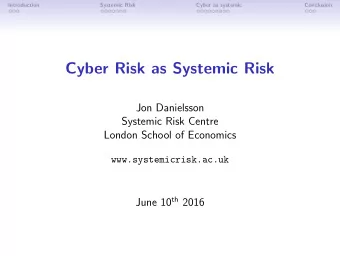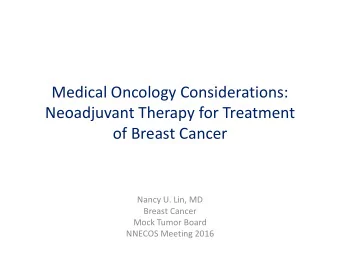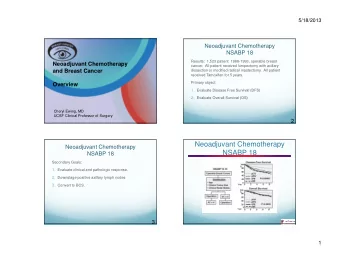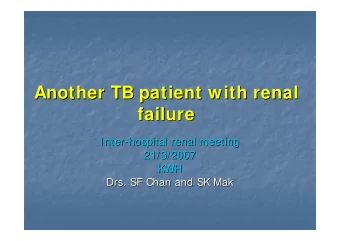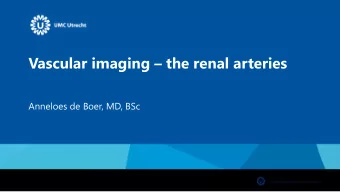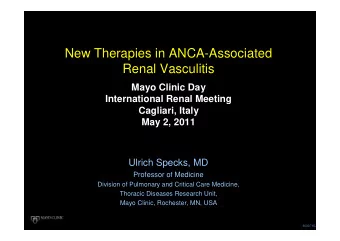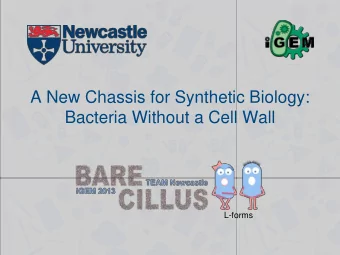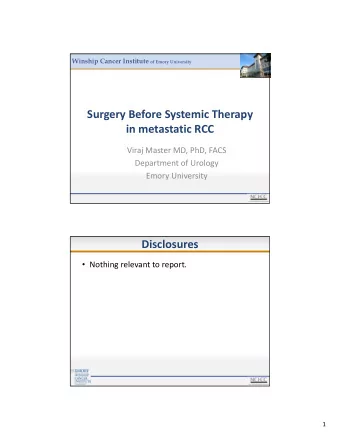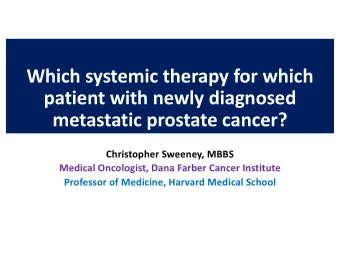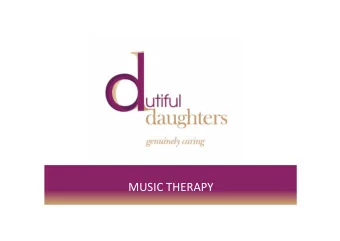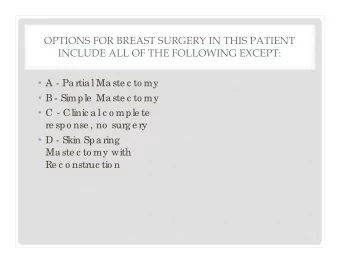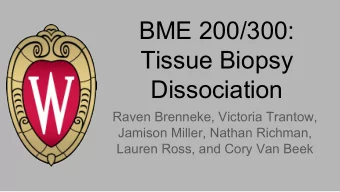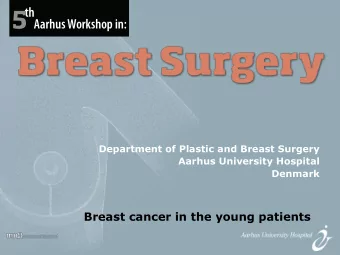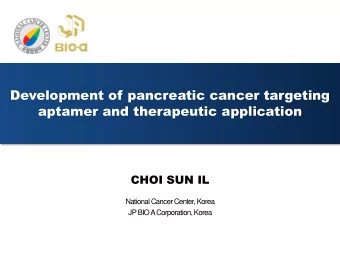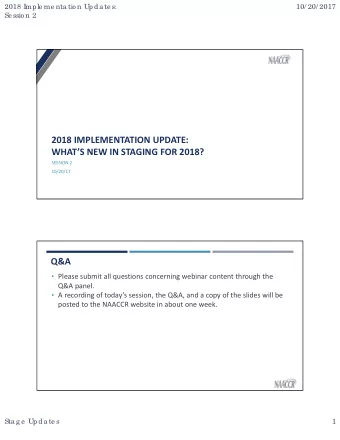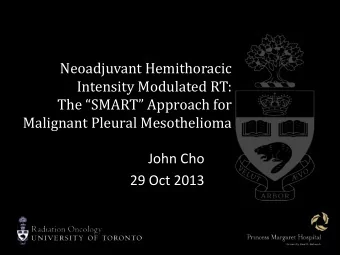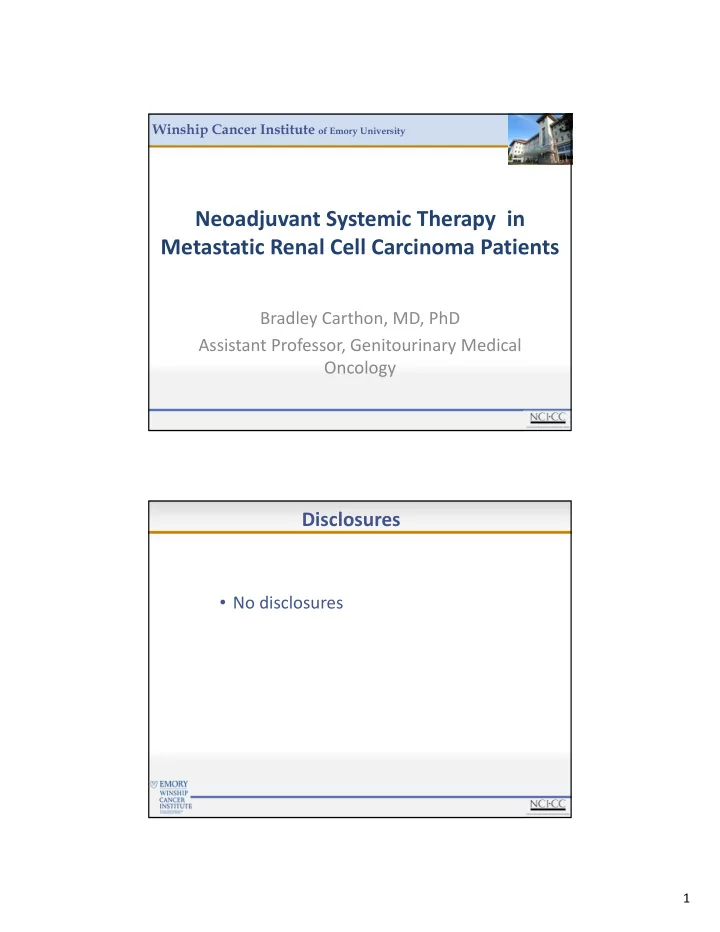
Neoadjuvant Systemic Therapy in Metastatic Renal Cell Carcinoma - PDF document
Winship Cancer Institute of Emory University Neoadjuvant Systemic Therapy in Metastatic Renal Cell Carcinoma Patients Bradley Carthon, MD, PhD Assistant Professor, Genitourinary Medical Oncology Disclosures No disclosures 1 Cytoreductive
Winship Cancer Institute of Emory University Neoadjuvant Systemic Therapy in Metastatic Renal Cell Carcinoma Patients Bradley Carthon, MD, PhD Assistant Professor, Genitourinary Medical Oncology Disclosures • No disclosures 1
Cytoreductive Nephrectomy Effect on OS VEGF Antagonist Era Interferon Era Flanigan et al , N Engl J Med. 2001 Dec 6;345(23):1655-9. Choueiri , T. et al. The Journal of Urology, Volume 185, Issue 1, 2011, 60 - 66 Prior Perioperative Trials In RCC Adjuvant Neo ‐ Adjuvant Leiter, A., & Galsky, M. Targeting Vascular Endothelial Growth Factor Receptor Signaling in Renal Cancer: The Sooner the Better? European Urology. Available Online 7 Feb., 2014. DOI: 10.1016/j.eururo.2014.02.059 2
The Hypothesis Neoadjuvant therapy in metastatic RCC can: • Occur safely in context of surgery • Downsize tumors • Spare surgery in futile patients • Affect PFS and possibly OS Neoadjuvant Bevacizumab and Primary Tumor Site Response • N=23 Bev + Erlotinib • N=27 Bev alone • 44/50 went to surgery (88%) • 6/50 progressed (poor risk) • Greater than 50% with some reduction • Delayed wound Healing in 20% Jonasch E et al. JCO 2009;27:4076-4081 3
Neoadjuvant Bevacizumab and Primary Tumor Site Response Jonasch E et al. JCO 2009;27:4076-4081 Neoadjuvant Bevacizumab: Outcomes and Toxicities • 1 complete response • 10% partial response • 58% had stable disease. • PFS comparable at 11.0 mos • OS was at 25.4 mos • Safely Tolerated Jonasch E et al. JCO 2009;27:4076-4081 4
Surgical Data in Patients Receiving Neoadjuvant Sunitinib Therapy in mRCC Powles T et al. Ann Oncol 2011;22:1041-1047 Patient Demographics: Neoadjuvant Sunitinib in mRCC Powles T et al. Ann Oncol 2011;22:1041-1047 5
Clinical Features in Patients Receiving Neoadjuvant Sunitinib in mRCC Powles T et al. Ann Oncol 2011;22:1041-1047 Response with Neoadjuvant Sunitinib in mRCC Powles T et al. Ann Oncol 2011;22:1041-1047 6
Metastatic RCC: MSKCC Prognostic Model 1.0 Risk factors: 0.9 • Diagnosis to treatment < 1 yr • KPS <80 0.8 Proportion Surviving • Low Hgb 0.7 • High corrected calcium 0.6 • High LDH •Greater than 2 sites disease 0.5 0 risk factors 0.4 1 or 2 risk factors 0.3 > 3 risk factors 0.2 0.1 0.0 1 2 3 4 5 6 7 8 9 10 11 12 13 14 15 16 17 0 Years Following Systemic Therapy Motzer RJ et al. J Clin Oncol . 2002;20:289 ‐ 96. CN Benefit by Performance Status in Targeted Therapy Era KPS > 80 KPS < 80 Kaplan-Meier curve of overall survival from initiation of VEGF targeted therapy by cytoreductive nephrectomy, and KPS 80 or greater ( A ) or KPS less than 80 ( B ). Choueiri , T. et al. The Journal of Urology, Volume 185, Issue 1, 2011, 60 - 66 7
MSKCC Criteria in Patients on Neoadjuvant Sunitinib Powles T et al. Ann Oncol 2011;22:1041-1047 Sunitinib in Non ‐ Resectable Patients ‐ Retrospective Data • 19 patients with advanced RCC unsuitable for nephrectomy • Received 50mg Sunitnib in 4/2 pattern • Partial responses in 3/19; 7/19 had stable disease; 9/19 had progression. • 4/19 (21%) of the patients later underwent nephrectomy • No unexpected complications and only 1 patient discontinued treatment due to toxicity • 5 patients or 25% died of disease progression within 6 mos (T3 disease and higher and peritoneal disease) Thomas et al. Journal of Urology, Volume 181, Issue 2, 2009, 518 - 523 8
Tumor Response with Sunitinib in Locally Advanced and Metastatic RCC • N = 30 • Median 28% Decrease, • 45% able to subsequently undergo nephrectomy Rini et al. The Journal of Urology, Volume 187, Issue 5, 2012, 1548 - 1554 Patients with Partial Response with Neoadjuvant Sunitinib in Locally Advanced and mRCC Rini et al. The Journal of Urology, Volume 187, Issue 5, 2012, 1548 - 1554 9
Neoadjuvant Axitinib Therapy in RCC Waterfall plot of tumor response in percentages at 12 wk of treatment. Orange indicates partial response, and blue indicates stable disease per RECIST. Karam et al. European Urology , 2014. Phase 2 Trial of Neoadjuvant Axitinib in Patients with Locally Advanced Nonmetastatic Clear Cell Renal Cell Carcinoma. http://dx.doi.org/10.1016/j.eururo.2014.01.035 Surgical Outcomes with Neoadjuvant Axitinib in RCC • 22 Patients did 12 week course • 28.3% median reduction of diameter • 11/24 had Partial response • 13/24 stable disease • No progression of disease while on axitinib • No grade 4 or 5 complications noted 10
Immediate Surgery or Surgery After Suninitinib in mRCC (SURTIME) Immediate Efficacy End R Nephrectomy then Projected Points a N = 458 Sunitinib Primary: n • Overall PFS • Resectable d Primary o • Metastatic Secondary m Disease • OS • No T3 or T4 i • Morbitidy • No Poor Risk z • No Prior • Overall RR Upfront Sunitinib e Therapy then Nephrectomy + Post Op Sunitinib October 2014 est Take Homes on Neoadjuvant Therapy in mRCC • Randomized Trials and Retrospective Data Demonstrating Safety • Downsizing Apparent in Many Cases, converting ‘unresectable’ patients • Spared Surgery in Futile Patients • Phase III Trial Ongoing Given Safety, Downsizing , and Ability to Spare Futile Surgery, Data Support Neoadjuvant Systemic Therapy vs. Upfront Surgery in ‘unresectable’ and metastatic RCC patients 11
Recommend
More recommend
Explore More Topics
Stay informed with curated content and fresh updates.
